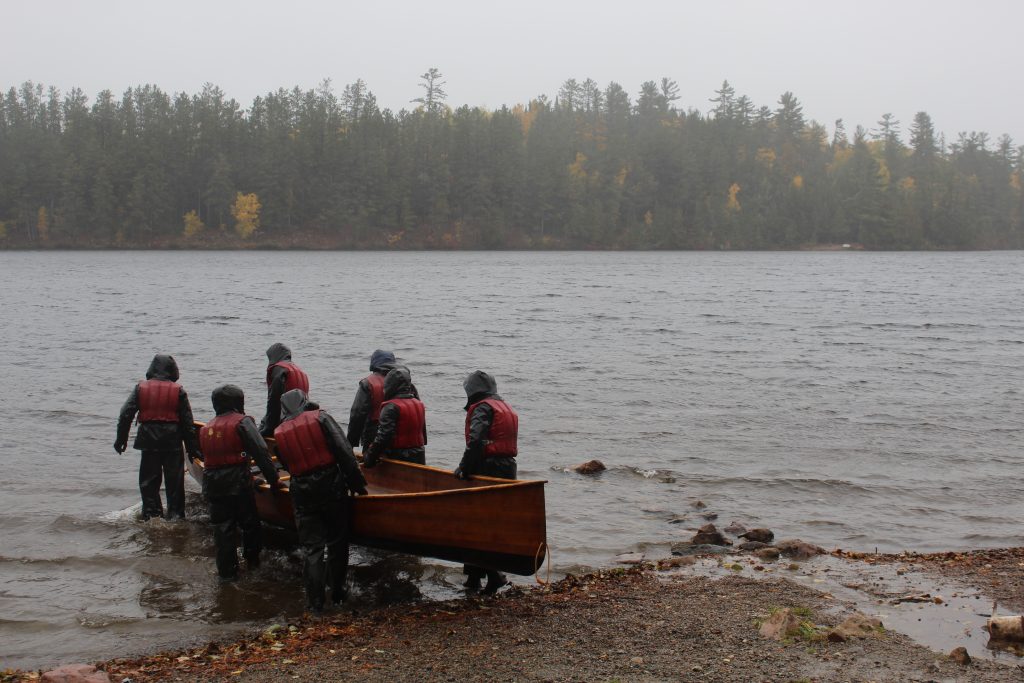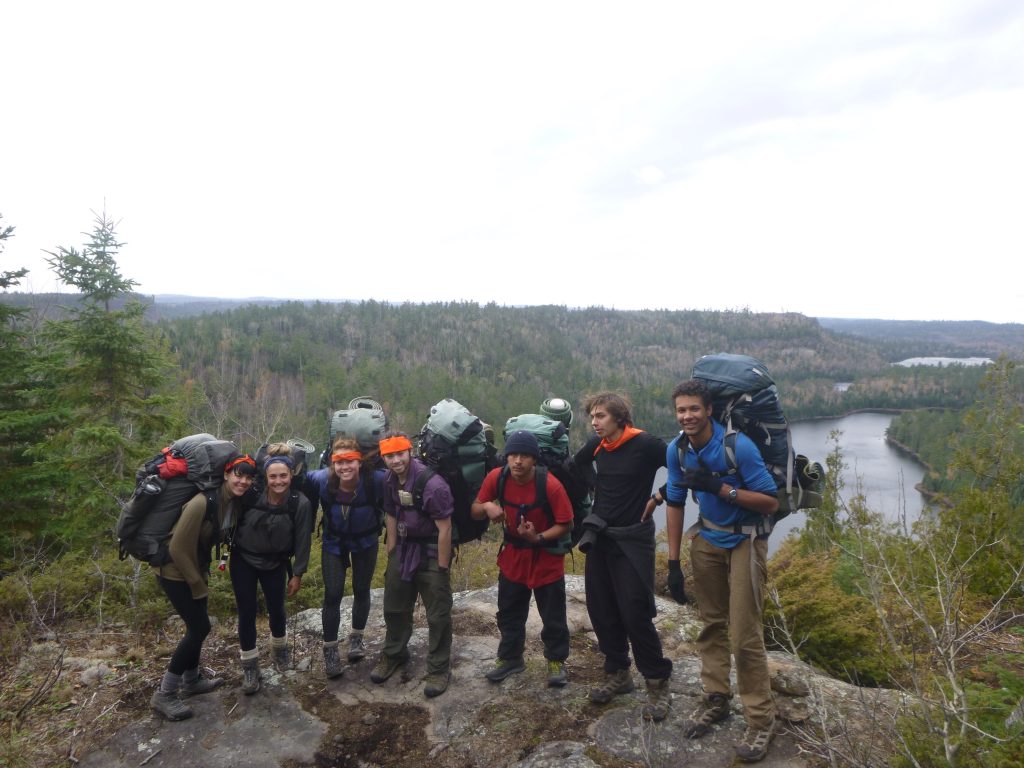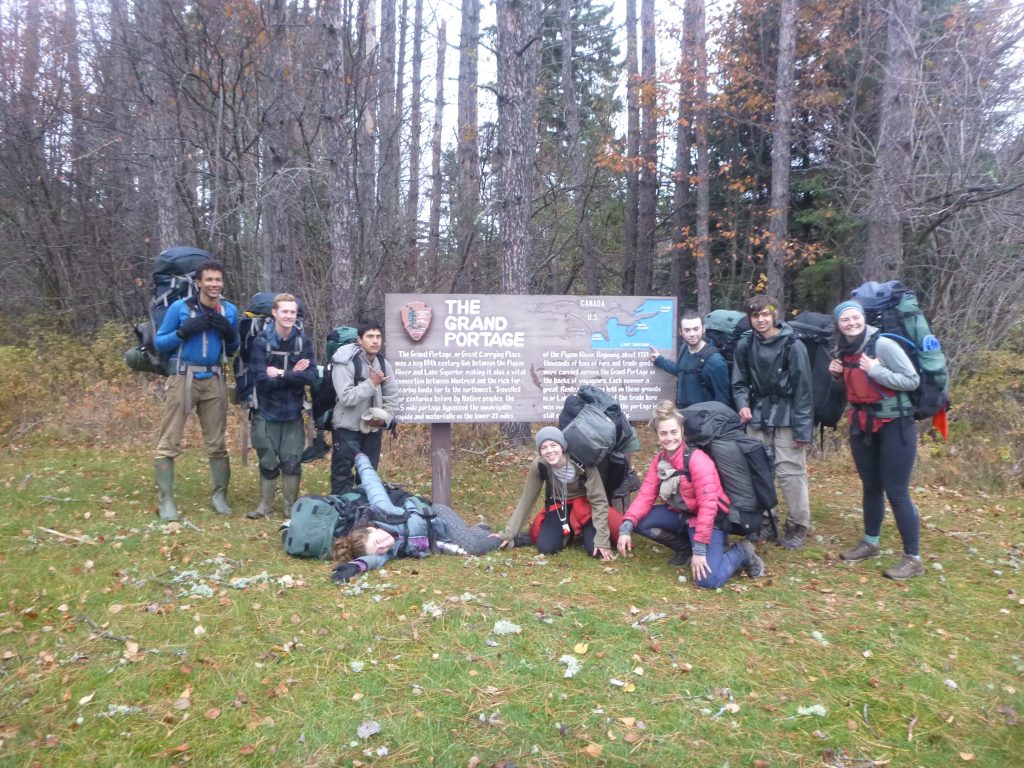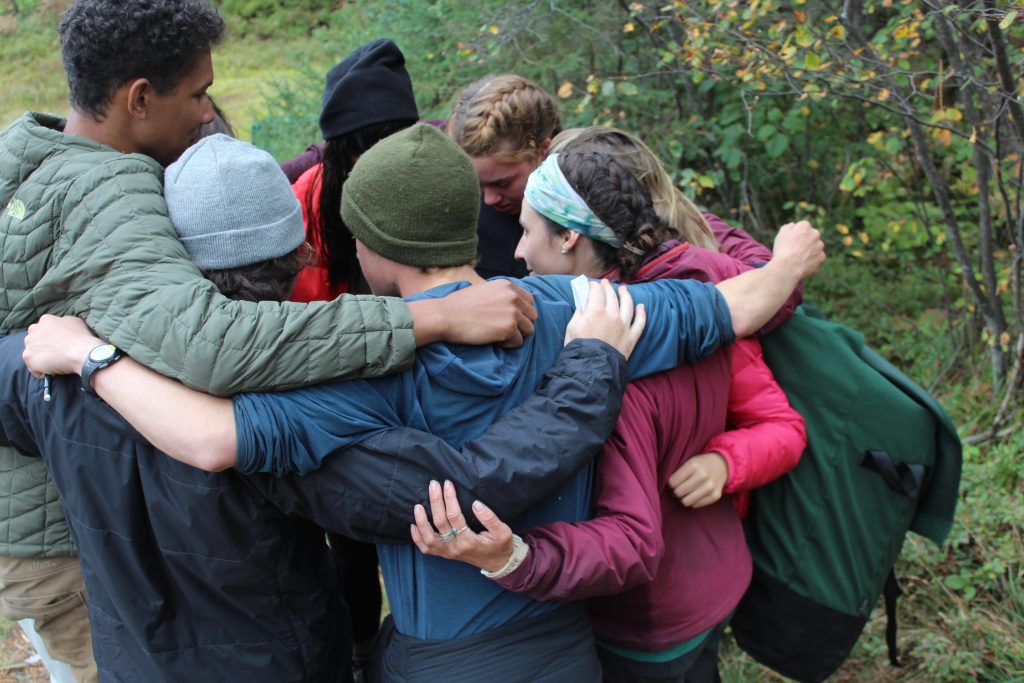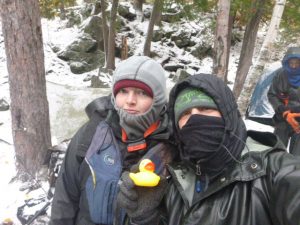It was the last two days of a burly 50-day course, and we were in for one of our biggest challenges yet. Simple as it was, this statement inspired our team to push on through the most miles I’ve ever hiked in a day with a student group.
The student who uttered this mantra was so tired she couldn’t quite string together the right words. She landed on, “The thing is… (pause for contemplation of how to rouse everyone…) we’re doing it! So let’s go!” Perhaps it was that manic energy but those words struck a chord and became our battle cry for this last challenge.
Working for VOBS
I’ve been an instructor at Voyageur Outward Bound School (VOBS) for three years. This was my third year instructing Fall Intercept Semester (Intermester). It is one of the most challenging and rewarding courses I instruct. The inherent difficulty of travel in the shoulder seasons (fall and spring) in the Boundary Waters makes these expeditions so formidable. It’s also what makes them incredibly memorable.
There’s nothing like jackhammering your way through ice with your canoe paddle to make your way across a frozen lake or starting a fire while it’s hailing to cook your dinner, or stopping for mandatory warming dances to make sure hands and toes stay safe.
Perhaps it’s the 50-day length that makes the end feel so triumphant and meaningful. Maybe it’s the unique opportunity to run two expeditions in one course. Or maybe it’s the students who take on this challenge – students who are at a pivotal point in their lives, where they are ripe for reflection, ready to question who they are and who they want to be, and are seeking a better version of themselves.
For these reasons (and many more), Intermester continues to inspire me. It calls me back every year because it is one of the most impactful experiences I get to be a part of here at VOBS.
Two Expeditions; One Course
Intermester courses will often have different instructors for the 1st and 2nd half of the course. Though this transition can be hard, it ultimately leads to stronger bonds among the student group, along with greater opportunity for them to step up as leaders. My co-instructor and I joined a group who had already learned many of the skills needed to solve problems and make decisions on their own. They had epic stories, inside jokes, and were understandably nervous to say goodbye to their 1st half instructors; instructors who had been with them through it all.
Our new crew spent a week at base preparing for the 2nd half, which consisted of a North Canoe expedition followed by backpacking on the Border Route between Northern Minnesota and Ontario, Canada. The crew made their own menu, route plan, and packed out their own gear.
On the day we left, mother nature welcomed us back with freezing rains and headwinds. These became our constant companions for the next few days. “Take care of yourself, take care of each other” became the motto we lived by, words that set the tone for this expedition.
The most amazing part of all the difficulty we faced, was the ways in which those challenges brought the team closer together. Though it was one of the hardest weeks I’ve endured on course, it was exactly what this group needed to learn how to be the best team they could be.
There is nothing more amazing than knowing, as an instructor, that you are not needed.
On a 50-day expedition, students take on more responsibility and freedom as they progress through the course. This progression becomes very meaningful and poignant over those 50 days. Students become equipped with technical and interpersonal skills, and the need for instructor input diminishes.
On this particular course, the students had certainly demonstrated their ability to take care of themselves and one another. They had all the skills they needed to run their own expedition – navigation, camp craft, firewood collection, cooking, paddling, resolving group conflicts, and tackling challenges as a team. We took our voices, and our presence, out of the picture.
On the Final phase of expedition, if a group goes the wrong way, as an instructor, you follow until they figure it out. Even if that means extra miles and late nights. It’s their expedition and they own the consequences of their decisions (unless of course they put themselves in danger, in which case we step in).
Educationally, it is one of the most magnificent tools we have at Outward Bound – giving people the chance to learn from experience.
With this group, when given free rein, they decided to stop early on the first few days of backpacking. We knew that the lost miles were adding up to some very long days to come. Nonetheless, we bit our tongues, and refrained from stepping in.
After a few days of early stops, they realized they were looking at a lot of miles left to cover in three days. Rather than let this get them down, the group decided to push even harder and not only make up the miles, but combine their last two days into one. To do so, they concluded, they would hike the last two days without stopping to sleep, and get picked up a day early. They came to us with their plan.
We contacted base. An early pick-up could be arranged but we would have to make it to the end of the Grand Portage (a nine-mile epic portage) by 9:00 p.m. Base was unsure if this was a realistic possibility. It would mean a grueling final two days of non-stop hiking, on the toughest terrain we had yet faced, with little time for rest or sleep; however, if this team had shown us anything, it was that they could rise to a challenge.
We came back to the group: “It’s ambitious. It might not be realistic, but it is possible. It would be about the most impressive travel days we’ve ever seen on course. If you’re determined, we certainly won’t stop you from trying! Let us know what time to get up and we’ll be right on your trail.”
Cut to 4:00 a.m. the next morning: it’s cold, dark and we’re staring down a gargantuan un-ending day. We pack up camp as the stars begin to fade. Though it wasn’t our first dark, cold morning, it’s never easy to shed the warmth of a sleeping bag and the comfort of rest.
Our hike began in a resolute silence as we left camp, still shaking off the sleep that clung to us. Spirits brightened as the sun came up, just as we rounded our first peak, illuminating the yellows and greens of the trees in the valley below. As the sun’s warmth reached us, an air of possibility and determination settled in. The group hiked faster and with such gusto it started to really seem possible.
They held that determination and dedication through the entire day. Breaks were short and efficient. Miles were passing by faster and faster. People were pushing through the discomfort, the sore muscles, the nagging blisters, and the desire for more breaks. We stopped for a quick meal and made a pot of coffee around 9:00 p.m., napping as we waited for the water to boil. Then, after a few rousing words, we marched on. We were doing it.
As hour 23 approached (3:00 a.m.) we were all exhausted. Our bodies ached. Our eyelids had long ago grown heavy. Our happy spirits drooped as another hour passed, weighed down by the many more to come. We had just left the path to crash through the depths of the forest, a route that is much harder and very slow going. The group wisely decided to get the rest they needed to continue on. They settled on a quick three-hour nap then back to finishing the last leg of the journey.
We awoke at first light and bushwhacked through dense forest as the tree branches caught us in the face and snagged our packs, pulling us back as we charged on. We trudged through sinking-mud and hopped over streams, yet made exceptional time. We were somehow still on track to finish the Grand in time for our pick-up.
We made it to the start of the portage at 5:00 p.m., just enough time, if we were efficient to accomplish our goal. We had gotten through the hardest part, with only an open, flat, nine-mile path ahead to the finish line. We called to inform base. They were surprised at how fast we had moved to get to the Grand. They were sending a van and heating up a cabin for us. We cheered, whooped and high-fived.
But the thing is…
There was an outhouse at the start of the Grand Portage and everyone wanted to use it. There was blister care that hadn’t been attended to in earlier breaks. There was dillydallying and a loss of focus. The euphoria of making it to the start of the Grand had blinded the group to the urgency we still faced. It was 6:20 p.m. by the time we continued on and our window for success looked like it was closing fast.
We walked faster than we had ever walked before. We flew through miles. But the pace was unsustainable. We were halfway there before we realized we needed longer to rest. People were pushing so hard that they already drank all their water. We needed to take more breaks, but those breaks, and our slowing pace, would cost us our chance at making the pick-up. So there we were, sitting on top of our packs, breathing hard, realizing that the goal had slipped right through our fingers.
The thought of sleeping in a heated cabin was replaced by the realization that we now needed to backtrack a few miles to the nearest water source and set up camp one last time. In that moment, the weight of failure sunk in. We were so close and were so convinced we were going to make it! What happened?
Yet, amidst those feelings of defeat, there was triumph too. Those last two days of expedition were some of the most epic travel days I’ve had on course and I made sure our crew knew that. We got back to base and shared our journey with the students’ parents. We told them about the mileage we made in those last days of expedition, about hiking for 23 hours straight, waking up after three hours of sleep to continue on through the densest part of the trek, making it to the Grand and speed walking until we dropped. Their response was, “My kid did that? Voluntarily?” We said yes! Your sons and daughters chose this, and they conquered each one of those miles through sheer willpower.
As they listened to their story, they didn’t hear a story of defeat; they heard impressive feats they wouldn’t have dreamed their child would embrace. They heard a tale of grit, of teamwork, and of determination that made them extremely proud.
So yes: we failed.
We failed a very ambitious goal. Yet, in failing to reach such a lofty goal, the group accomplished more than any of them imagined they were capable of at the beginning of their expedition. They lost sight of their goal in those last moments, and they certainly felt that. But, upon a little reflection, they felt the triumph of setting an incredibly ambitious mission that revealed just how much grit and perseverance they have when they are motivated and dedicated to reaching their goals.
We greeted sleep that night knowing that we had earned it; feeling in our bodies the satisfying ache of pushing ourselves past the many moments we doubted we could continue on.
In that final push, we experienced two of the most essential lessons Outward Bound can teach – how to embrace success AND defeat. In our case, both struck at once.
That’s the thing with an expedition, it always finds a way to teach you what you most need to learn. When the consequences are real and immediate, when they are crafted by your own choices, they sit with you in a way that is profound and enduring.
I will never forget that moment: sitting on the Grand Portage, panting with my team, feeling the disappointment of defeat and the pride of accomplishment all at once, and being deeply grateful for the lessons learned from both.
To learn more about the Voyageur Outward Bound School Intercept Semester program, please visit the course pages below.
Intercept Boundary Waters Semester
Upcoming Courses:
| COURSE # | DATES | DAYS | AGE | COST | |
|---|---|---|---|---|---|
| VMSF-971 | 4.22.19 – 6.10.19 | 50 | 17 – 21 | $11,995 | APPLY NOW |
| VMSF-972 | 6.24.19 – 8.12.19 | 50 | 17 – 21 | $11,995 | APPLY NOW |
| VMSF-973 | 9.16.19 – 11.4.19 | 50 | 17 – 21 | $11,995 | APPLY NOW |
| VMSF-071 | 4.20.20 – 6.8.20 | 50 | 17 – 21 | $11,995 | APPLY NOW |
Intercept Texas Big Bend Semester
| COURSE # | DATES | DAYS | AGE | COST | |
|---|---|---|---|---|---|
| VRSF-972 | 10.21.19 – 12.9.19 | 50 | 17 – 21 | $11,995 | APPLY NOW |
| VRSF-071 | 1.21.20 – 3.10.20 | 50 | 17 – 21 | $11,995 | APPLY NOW |



